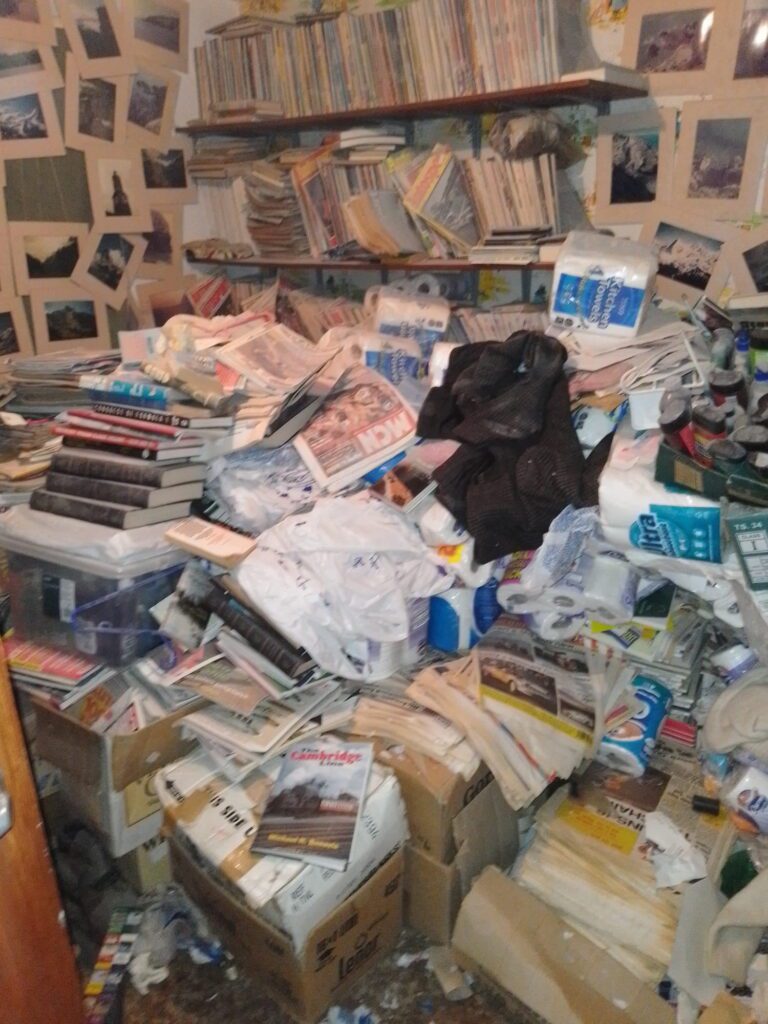A team of extreme cleaners have revealed pictures of one of their biggest ever challenges – clearing the home of a chronic hoarder.
Aftermath Scotland don biohazard suits to tackle jobs like crime scenes, drug dens – and people who amass clutter.
Video and images show a recent job at a home packed to the walls and ceilings with piles of objects – most people would throw away.
There are stockpiles of canned food, cleaning products, magazines and toilet rolls filling the property, piling to the ceilings in rooms that took five weeks to clear.


With the family’s permission, the team have shared photos and videos from inside the home, which they say was one of their most challenging jobs.
The firm began when Andrew Irvine, and his friend David Johnston-Oates, noticed that there was a lack of extreme cleaning services in rural Scotland.
A recent job in Aberdeen involved an unattended death.
The deceased had also become a hoarder, not know to to their family, who lived in Manchester.
With the family’s permission, the team have shared photos and videos from inside the home, which they say was one of their most challenging jobs.
”Initially, it was an unattended death, but when we got in there, we realised there was a hoarding situation as well,” Andrew said.
“After the unattended death was sorted, we went in again to help the family with the hoarding situation and the cleaning.
“We built that rapport with the family and helped get some of the person’s belongings moved down for them.”


David added: “It can be nerve-wracking.
”We know what we were doing, and we knew that we were trained, but when your masks are on and you’re in there, it can be quite difficult to communicate with each other.
“It took the fire service and the undertaker a full half day to remove the deceased from that property because they had to clear a path through the belongings. It was so severe.
“We worked on that hoarding every single day for about five weeks. In this unattended death, the deceased had been hoarding food.
“I think it was partly because of all the scaremongering during COVID – the fridge was filled with food from 2020, and the cupboards were full of toilet rolls, that sort of thing.
“For the families, it all makes sense eventually. Normally, the person that’s hoarding won’t want people to come to their house, so they’ll arrange to meet in other places.
“The family did see the deceased quite a lot, but they always met outside the home.
“Hoarders tend to hide it very well, so they don’t like people visiting their property and can be quite reclusive. Even neighbours don’t tend to notice.
“Nobody really knows the severity of it until they get inside the house.”
David and Andrew deal with many extreme cleaning scenarios, including crime scenes, hoards, drug dens, and hotels.
However, they believe that being able to relieve some of the burden of a grieving family makes the job worthwhile.
“A straightforward unattended death can take a few hours to clean, depending on the severity and how long they’ve been there for,” David said.
“A normal unattended death will always be done on that day.
“Drug dens can take days, because you have to be so meticulous. They can be dangerous situations, because if a drug user has maybe been evicted, they can set traps in the property.


“A normal hoard, when someone’s suffering from poor mental health, we go at their pace. We might go in one day a week for a month, or two days every couple of weeks, and we do it gradually.
“The last thing we want to do is cause any added stress to the person that’s suffering, so it’s all about working with them to do it at their pace.
“I think the most challenging part is seeing what the families are going through, and the trauma.
“We’ve got to be professional, but it’s normally after the job is complete that we’ll reflect on it and talk about it.
“But the appreciation makes it worth it. It’s so rewarding to be able to take that pressure off grieving families or people suffering from mental illness.”
Andrew added: “It’s amazing to see people improve over time as well.
“When we sort a hoarding situation, and a person is able to enjoy their home again, seeing the change in that person is amazing.”


